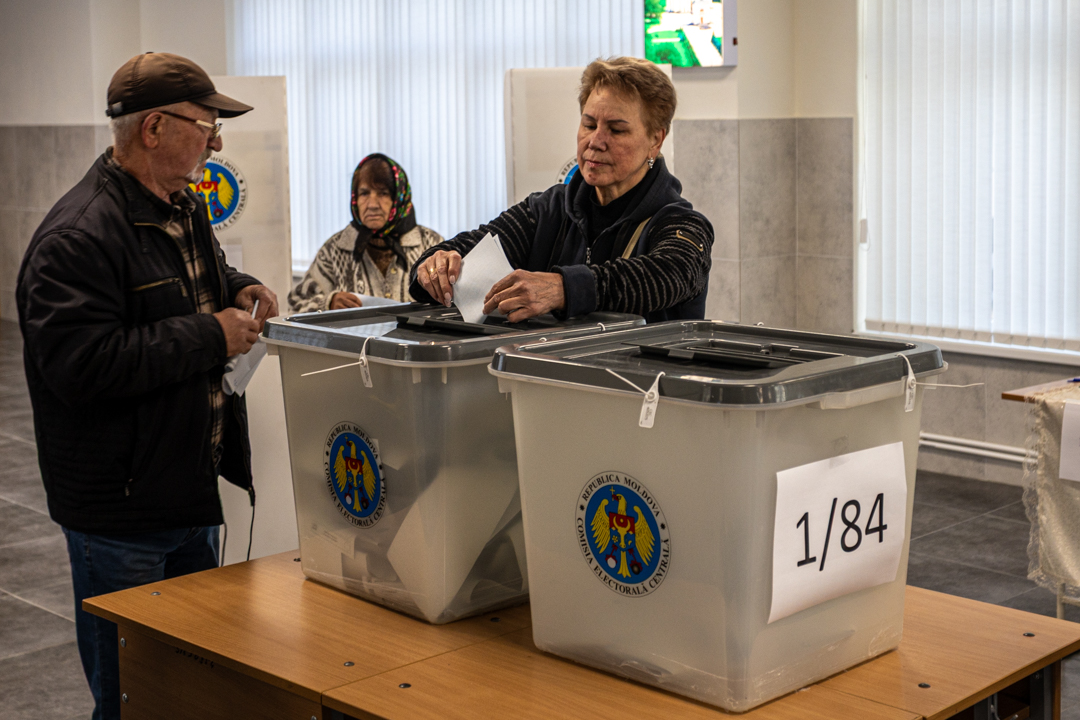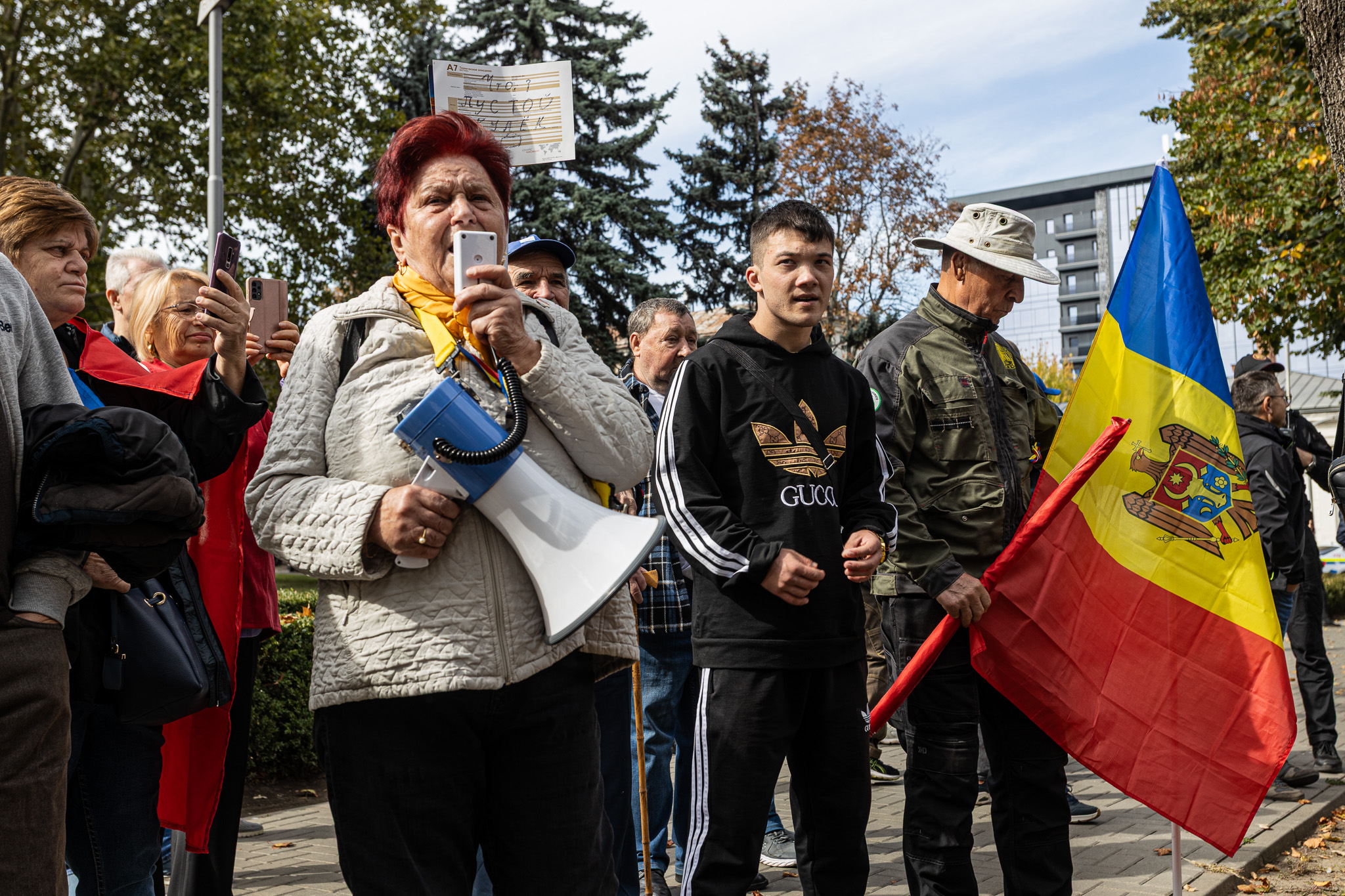
Read our Monthly Magazine
And support our mission to provide fearless stories about and outside the media system
In front of the Parliament building in Chișinău, a monumental white concrete structure built during the Soviet era and designed to resemble an open book, several hundred protesters wave Moldovan flags. On this autumn afternoon, their cries echo down the central avenue: “Freedom!” and “Moldova!” Many have come to support Igor Dodon, the former, pro-Russian, President, who disputes his defeat in the parliamentary elections on Sunday evening.
Close to the Kremlin and regularly accused of being Moscow’s mouthpiece for discrediting the ruling power in Moldova, Dodon embodies an opposition that makes no secret of its sympathies for Vladimir Putin. His supporters denounce electoral fraud, but for the Moldovan authorities, the real and massive interference took place elsewhere: online.
Disinformation articles, fake videos of politicians, cyberattacks, Russian-funded bots on social media – throughout the weekend, the country was bombarded with content designed to undermine confidence in the election.
To no avail. President Maia Sandu’s center-right Party of Action and Solidarity (PAS), in power since 2021, won 50.20% of the vote, according to figures from the Electoral Commission. In this country of 2.4 million inhabitants, wedged between EU and NATO member nation Romania, war torn Ukraine, and the pro-Russian separatist region of Transnistria, the vote was seen as a test for Russian hybrid warfare.
ENJOYING THIS ARTICLE? HELP US TO PRODUCE MORE
Receive the monthly Byline Times newspaper and help to support fearless, independent journalism that breaks stories, shapes the agenda and holds power to account.
We’re not funded by a billionaire oligarch or an offshore hedge-fund. We rely on our readers to fund our journalism. If you like what we do, please subscribe.
Ballot Battle Fought on Cell Phone Screens
To gauge the extent of online disinformation, all you have to do is accompany Mirula Burcalu. A foreign language student under a long beige coat and square glasses perched on her nose. As she crosses the center of Chișinău, she sits down on a bench in the cathedral park, and takes out her phone.
“Look at this one,” she says, opening TikTok. After only five videos, her news feed is covered with pro-Russian content. On the screen, a man films himself in his living room, confidently denouncing President Maia Sandu, “He is saying that President Sandu has hidden million-dollar luxury properties on the East Coast,” Mirula translates. She swipes. “On that one, they are calling Maia Sandu a liar.”
For Mirula, the mechanism is relentless. “Moldovans are exposed to this narrative, no matter what they do,” she sighs. She describes a succession of sequences in which the algorithm highlights accusations against President Sandu: embezzlement, betrayal of the country’s interests. “It’s like a nightmare,” she says, “because Moldova deserves to be in the European Union, but these videos are trying to convince people otherwise.”
Moldova — Testing Ground for Russian Hybrid Warfare in Europe
On September 9, Maia Sandu, invited to speak before the European Parliament, estimated that Moscow had “spent the equivalent of one per cent of Moldova’s GDP to influence the 2024 presidential elections,” or approximately €166 million.
“The Kremlin’s goal is clear: to take over Moldova through the ballot box, use it against Ukraine, and turn the country into a springboard for hybrid attacks against the European Union,” she explained to MEPs. Although nothing has been quantified for these elections, Maia Sandu believes that Russia’s influence campaign for Sunday’s elections was “unprecedented”.

For many analysts, Moldova has become a prime testing ground for Moscow in its hybrid warfare in Europe. In his office in central Chișinău, Valeriu Pașa tries to counter the “secret Telegram groups that carry out hundreds of actions designed to flood TikTok and Facebook with anti-European content.”
With his dark hair and three-day beard betraying his accumulated fatigue, the president of the independent think tank Watchdog.md meticulously observes disinformation campaigns. He scrolls through the notifications popping up on his phone. The scale of the operations impresses the researcher. “They created about five times more content than for the US elections,” he says.
The current campaign is on a whole other level. “Unprecedented in scale,” insists Valeriu Pașa. The arsenal is no longer limited to artificial intelligence and “engagement farms” — those factories of fake accounts on X.
Now, the Kremlin is polishing its weapons and refining its strategy. “Before, Russia used foreign bot farms. It was crude; you would see Vietnamese or English names commenting on Moldovan articles. Now, they are recruiting Moldovans who know the language and the local context,” explains Valeriu Pașa.
Identified and contacted via Telegram, these very real “infoleaders” are often recruited by pro-Russian parties linked to oligarch Ilan Shor. Leader of the Sor party, which was dissolved in 2023 due to its ties to Moscow, Shor has since taken refuge in Russia, where he became a citizen in 2024.

There is something for everyone. “The propaganda is clever, it affects the whole of society,” according to Valeriu Pașa. For the most marginalised, it serves up conspiracy theories: the leader of PAS is allegedly involved in trafficking sperm from gay celebrities, from Elton John to Ricky Martin. It’s a crude ploy, but effective in a country where conservative values remain strong. The status of the President Maia Sandu as a single, childless woman fuels the most simplistic attacks.
Unprecedented Destabilisation Attacks During Election
According to a high-ranking security source close to the presidency, the Moldovan elections were also marked by a series of cyberattacks that disrupted public infrastructure.
The attackers, identified by the services as being linked to Russian networks, sought to overload the most sensitive systems. “They were targeting some pages related to the Ministry of Interior, pages dedicated to emergency services for 112 emergency calls,” the source explains. Moldova’s cybersecurity services reported several attempted cyberattacks on “electoral infrastructure”.
The incidents included “denial-of-service with more than 16 million sessions generated, designed to simulate real traffic and bypass protection systems, attempts to introduce malicious code into databases, and malware infections in polling stations,” the source explained.
The Parliament was also targeted. “The Parliament’s website was down, but it was restored within an hour,” the source said.
Despite Moscow’s attempts to paralyse the vote online and on the ground, Moldova’s institutions held firm. The calm streets of Chișinău the next day contrasted with the scale of interference — and underscored a fragile but growing resilience. For President Maia Sandu, the pro-European victory is more than an electoral result: it is proof that the country can resist intimidation and move, step by step, closer to the European Union.
